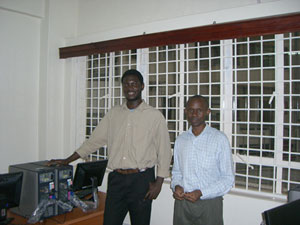
He has spent two weeks performing research in Africa with Rexford Ahene, professor of economics and business and coordinator of Africana studies
George Armah ’08 (Accra, Ghana) is pursuing a B.S. mathematics and A.B. with a major in computer science. He is working this summer with Rexford Ahene, professor of economics and business and coordinator of Africana studies, to develop a critical evaluation of preliminary design proposals for a national Land Information System network in Uganda. He spent two weeks in Uganda and has returned to campus today. The following is a “Letter from the Field” about his experiences.
After more than 300 kilometers of driving from Uganda’s capital, Kampala, we have finally arrived at the Soroti District Land Office. I am glancing around the room as the senior land officer tells us about the problems his department faces in helping the townspeople lawfully register their land.
The office is at most 14 by 20 feet. Three land officers occupy the room with one position currently vacant. There are no computers; just books, pens, pencils, and half open cabinets. The story has been no different for each district land office we have visited. The land officer mentions that each time a person wants to register, he has to make the trip to the capital (sometimes multiple times) to process the necessary documents.
In Uganda, like in most developing countries, land is the sole most valuable asset of majority of the people. Having one’s land registered opens up new financial possibilities. For instance, a farmer cannot use his land as collateral for a bank loan without first getting it registered.
This summer, through Lafayette’s EXCEL program and under the guidance of Professor Ahene, I have been researching methodologies and technical challenges involved in building a national Land Information System (LIS), with a focus on Uganda.
Uganda’s current manual system has poorly kept records with some of the documents literally falling apart. It is also facing problems with corruption, data inaccuracies, and is on the whole a slow, inefficient system. The ongoing project involves digitizing all of the land records, along with survey maps and other geographic data. The records are also being rehabilitated and the staff is being trained to manage the computerized system.
Along with addressing the current problems facing land administration in the country, the fully functional Ugandan LIS will be able to link various sources of information – such as census data, transportation system maps, and environmental data – with particular geographic locations. This ability to relate complex data sets and display information in layers of simple mapped outputs will make it an important tool for Uganda’s decision makers.
I have heard views from Ugandans at a forum on land policy and spent time learning from system administrators at Kampala’s land office. Through these experiences, I now better understand the impact a land administration overhaul will have on the average Ugandan. These interactions have also helped me put my research in a Ugandan context. During my conversations, I have sensed a strong willingness to see the project succeed. People here understand that formulating land policies, reviewing land laws, and computerizing land administration are just a means to an end that will see Uganda’s citizens reap the full benefits from their land.
Coming from Ghana, I expected to find a lot of cultural similarities in Uganda. Ghana and Uganda both share the same colonial mistress: Britain. I was almost fooled on the first night’s drive from the airport to the hotel. The Entebbe-Kampala road could have passed for a carbon copy of Accra’s Achimota road.
As time wore on, differences began to surface. I thought Ghana’s 48 indigenous languages was a large number for a single country. Imagine my surprise when I learned that Uganda has almost double that number. You could find villages with completely different languages a stone’s throw apart. Learning these and other cultural subtleties has helped me better understand the challenges facing the current project.
I am confident that it was Lafayette’s unique combination of support for undergraduate research, diverse and dedicated faculty, and commitment to non-traditional learning experiences that gave me this opportunity. An opportunity to learn from, analyze, critique, and contribute in some meaningful way to a project that I’d daresay is critical to Uganda’s success as a nation. I am truly grateful to Professor Ahene and Lafayette for such an experience and am sure it will go a long way in shaping my plans for life after college.
